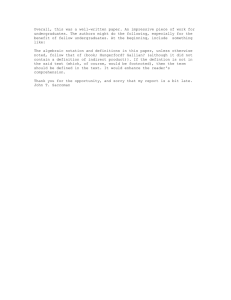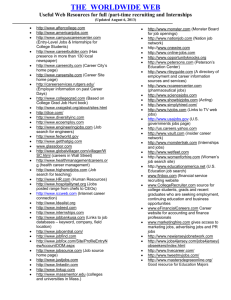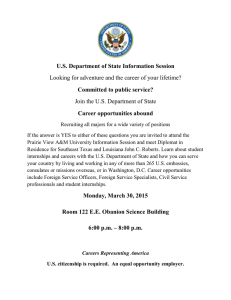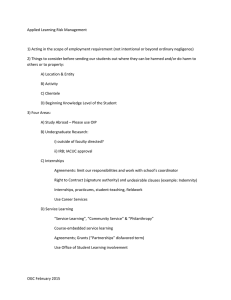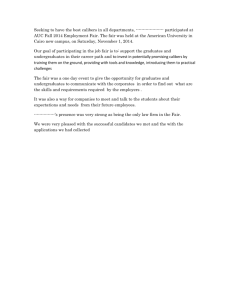Our group designed and implemented ... - questionnaire survey and interviews. The ...
advertisement
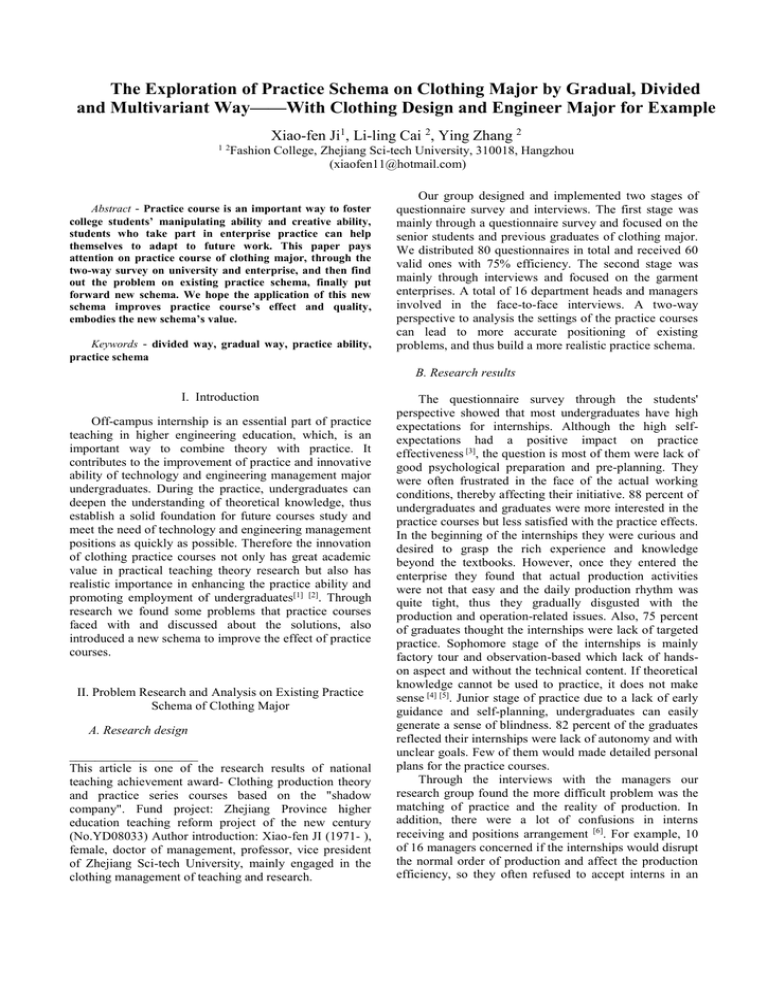
The Exploration of Practice Schema on Clothing Major by Gradual, Divided and Multivariant Way——With Clothing Design and Engineer Major for Example Xiao-fen Ji1, Li-ling Cai 2, Ying Zhang 2 12 Fashion College, Zhejiang Sci-tech University, 310018, Hangzhou (xiaofen11@hotmail.com) Abstract - Practice course is an important way to foster college students’ manipulating ability and creative ability, students who take part in enterprise practice can help themselves to adapt to future work. This paper pays attention on practice course of clothing major, through the two-way survey on university and enterprise, and then find out the problem on existing practice schema, finally put forward new schema. We hope the application of this new schema improves practice course’s effect and quality, embodies the new schema’s value. Keywords - divided way, gradual way, practice ability, practice schema Our group designed and implemented two stages of questionnaire survey and interviews. The first stage was mainly through a questionnaire survey and focused on the senior students and previous graduates of clothing major. We distributed 80 questionnaires in total and received 60 valid ones with 75% efficiency. The second stage was mainly through interviews and focused on the garment enterprises. A total of 16 department heads and managers involved in the face-to-face interviews. A two-way perspective to analysis the settings of the practice courses can lead to more accurate positioning of existing problems, and thus build a more realistic practice schema. B. Research results I. Introduction Off-campus internship is an essential part of practice teaching in higher engineering education, which, is an important way to combine theory with practice. It contributes to the improvement of practice and innovative ability of technology and engineering management major undergraduates. During the practice, undergraduates can deepen the understanding of theoretical knowledge, thus establish a solid foundation for future courses study and meet the need of technology and engineering management positions as quickly as possible. Therefore the innovation of clothing practice courses not only has great academic value in practical teaching theory research but also has realistic importance in enhancing the practice ability and promoting employment of undergraduates[1] [2]. Through research we found some problems that practice courses faced with and discussed about the solutions, also introduced a new schema to improve the effect of practice courses. II. Problem Research and Analysis on Existing Practice Schema of Clothing Major A. Research design ____________________ This article is one of the research results of national teaching achievement award- Clothing production theory and practice series courses based on the "shadow company". Fund project: Zhejiang Province higher education teaching reform project of the new century (No.YD08033) Author introduction: Xiao-fen JI (1971- ), female, doctor of management, professor, vice president of Zhejiang Sci-tech University, mainly engaged in the clothing management of teaching and research. The questionnaire survey through the students' perspective showed that most undergraduates have high expectations for internships. Although the high selfexpectations had a positive impact on practice effectiveness [3], the question is most of them were lack of good psychological preparation and pre-planning. They were often frustrated in the face of the actual working conditions, thereby affecting their initiative. 88 percent of undergraduates and graduates were more interested in the practice courses but less satisfied with the practice effects. In the beginning of the internships they were curious and desired to grasp the rich experience and knowledge beyond the textbooks. However, once they entered the enterprise they found that actual production activities were not that easy and the daily production rhythm was quite tight, thus they gradually disgusted with the production and operation-related issues. Also, 75 percent of graduates thought the internships were lack of targeted practice. Sophomore stage of the internships is mainly factory tour and observation-based which lack of handson aspect and without the technical content. If theoretical knowledge cannot be used to practice, it does not make sense [4] [5]. Junior stage of practice due to a lack of early guidance and self-planning, undergraduates can easily generate a sense of blindness. 82 percent of the graduates reflected their internships were lack of autonomy and with unclear goals. Few of them would made detailed personal plans for the practice courses. Through the interviews with the managers our research group found the more difficult problem was the matching of practice and the reality of production. In addition, there were a lot of confusions in interns receiving and positions arrangement [6]. For example, 10 of 16 managers concerned if the internships would disrupt the normal order of production and affect the production efficiency, so they often refused to accept interns in an excuse of produce busy or no time reception. This happened especially to the sophomore interns. Managers believed that the young interns would not be suitable for the specific work, and less job autonomy and objectives [7] [8] . In addition, the lack of prior well-organized and detailed planning might bring difficulties for management and control. In short, the existing practice schema of clothing major cannot fully match the undergraduates’ learning ability, cognitive rules and practice expectations. Each stage of the internships does not fully consider the interface between the students' knowledge structure. Second, the specific contents and form are failed to constitute a "seamless connection" with the business operations. In addition, deficiencies in targeted and autonomy of the courses result in unfully mobilized enthusiasm and initiative of the undergraduates, eventually lead to a far cry from the actual effect to the expectations. III. The Exploration of Practice Schema on Clothing Major A. Emphasize on a gradual process in learning practical knowledge Internships of universities are quite different from that of college (2 or 3 years). The former focuses on the cultivation of students' operation ability and practical ability [9], while the latter pay more attention to the cultivation of students' comprehensive and innovative ability. Therefore clothing major internships should focus on students' comprehensive ability. First, taking the master of theoretical knowledge as the basis of practice, and then deepen the understanding of professional knowledge though practice, thus use the theoretical knowledge and practical experience in innovative applications of expertise. The settings of new practice courses system must emphasize on a gradual way of practical knowledge learning. It would be better to begin with basic theoretical knowledge and make reasonable arrangements for the process, therefore help undergraduates gradually master the theoretical knowledge and practical knowledge, so that they can promote each other. B. Emphasize on divided projects and assessment which meet a diversified requirements of students Humanistic learning theory suggests that learners themselves have the ability to learn, the learning process make sense for learners when learning content matches with their purpose [10]. Internships are an important way for undergraduates to acquire knowledge. Though practice students can not only access to job-related skills [11], but also increase professional self-efficacy, and then facilitates the formation of vocational self-concept [12]. However, the practice will not achieve the expected effect once the practice mode is not appropriate and the students' interests or purpose go against the practice content. In the recent survey we found that only 10 percent of the undergraduates can link current practice with the industry status and future employment, while most of them treat practice as a required courses or practical classes for college, thus the lack of initiative contributes to an unsatisfactory result. Therefore the settings of practice courses must pay attention to students’ interest and career choice. The new system must emphasize on the diversified interest requirements of undergraduates and develop a divided internships program and assessment which meet the needs of different specialty. C. Practice schema on clothing major by gradual, divided and multivariant way According to the research, interviews, and analysis of the key points of setting practice courses, we proposed a practice schema by gradual, divided and multivariant way. In accordance with the principles of gradual and orderly progress, the new schema is supposed to begin with perceptions to stimulate students' interest and curiosity, encourage them to move on to the problem exploration, and then improve and expand professional skills, and finally to the stage of the cultivation of professional skills. The gradual way emphasize on the comprehension and innovation of theoretical knowledge as well as reasonable arrangements of training period. It forms a step by step learning process which follows a principle from emotional to rational and primary to advance. The divided way refers to the personalization and pertinence of practice schema, namely training students in accordance with individual differences and carry out the project on reality. The multivariant way refers to the differentiation of assessment methods which suppose to be fair and Practice content Step by step Gradual way Practice schema Practice form Divided way; Pertinence Practice assessment Multivariant way; Differentiation objective. See Figure 1. Fig. 1. Structure and characteristic of practice schema by gradual, divided and multivariant way. IV. The Project of Practice Schema on Clothing Major A. Practice content design The research group designs three stages of practice content. The purpose of off-campus internships in second year of college is to help the undergraduates recognize and understand the industry and the employees’ psychology, ethics and professionalism. Also have a preliminary understanding of the actual situation of production, operation and management of modern enterprises and enhance the theories to acquire more perceptual knowledge. Internships in third year of college is supposed to apply knowledge and skills to the practical and flexibly solve and deal with practical problems encountered in the process of operational management, such as production technology, product quality and marketing planning. Also they must enhance the problem-solving ability. In the fourth grade undergraduates should carry out the graduation project while facing the problem of employment. In this period internships can integrate with graduation project. Undergraduates can enhance career self-efficacy through internships and smoothly get to work [13] [14]. B. Practice form design We refine the internships into three stages following the cognition rule and knowledge structure of undergraduates. First, we propose utilize of inquiry-based practice which is practical-oriented and inspire undergraduates to take the initiative to find the practical problems of enterprise’s operation process. Undergraduates would acquire perceptual knowledge of realistic production management and operation conditions through the sophomore stages of practice. At the same time, with their inspection they can find some existing problems in the enterprises, and then think about possible solutions. In order to strengthen the above capacity, we suggest the form of research projects in the junior stage. Undergraduates will carry out relevant projects and independent proposition based on the topic provide by the teachers in the practice process according to their direction. They must submit the report at the end of the internships. This stage can also be referred to the graduation practice and have greater autonomy. C. Practice assessment design Existing assessment method is mainly based on the practice diary and production practice report, partly based on the reviews and discipline of the production practice. This assessment method is so results-oriented that it goes against students' enthusiasm and cannot guarantee the practice effects. In addition, the teacher’s assessment criteria may be quite different from the enterprise; it is difficult to balance two of them within the same goal. The practice system can consider both colleges and enterprises [15] . Therefore we introduce report and communication section to the assessment criteria. The specific approach is: both undergraduates and the corporate staff participate in the communication meeting in the guidance of the teacher at the end of the internships. First, undergraduates report their experience; then, on-site students and teachers are free to ask them questions; finally, corporate staff and teachers give a score considering the performance of the undergraduates, including their performance in the internships. The final score should be based on the undergraduate’s understanding of the position, the actual practice performance and the ability to identify and solve problems. TABLE I Details of practice schema by gradual, divided and multivariant way Stage Skills Capacity Form Assessment Second Basic Perspective Question- ability oriented Practice project- Communica tion meetings; Discipline; Company reviews; Practice report Third Specialty ability oriented Forth Professio Innovative independent nal ability proposition V. Key Points of the Application of New Schema A. Arousing practice enthusiasm and initiative It is not easy to apply and promote the practice schema by gradual, divided and multivariant way. The primary problem which is quite critical in the second year of college is how to stimulate the practice enthusiasm and initiative of the undergraduates. To this end, excellent graduates should be invited to give lectures early of the practice. Details of communication including: organizational form of internships, difficulties in the practice, issues should be taken care and suggestions on the choice of internships positions. Also, clothing business managers can be invited to give some introductions about the positions, including: working environment, work processes, basic quality and specific requirements of different positions, salary comparison, and future development of different positions. According to our experience in the practice training courses, these measures have good guidance and inspiration for students and help students to set the right goal in practice, thus to arouse the enthusiasm of students to initiatively plan and actively participate in the internships. B. Monitoring and making objective evaluation of student's practice process Internships are a self-learning process and are mostly conducted dispersedly. However, the practice courses often go in to an awkward situation that the learning process is difficult to control and the effects are difficult to compare. To solve this problem, we designed a practice process management approach relying on the practice network platform for the relevant functions. For example, students involved in internships are required to register basic information (daily practice arrangements, basic information of the teacher, e.g.) to enable teachers to keep abreast of the progress of internships; In addition, students need to upload internships diary and practical report regularly so teachers are able to make a comparison of the process according to the complementation speed and quality of the process results. Such a schema not only contributes to the achievement of the objective and comprehensive assessment of the practice courses but also arouse the initiative and enthusiasm of the students to participate in internships. VI. Conclusion Off-campus Internship is an important way to enhance comprehensive ability, practical ability and innovative ability. It is an essential practical course in project management major. We pointed out several problems and deficiency in existing practice courses of clothing major though questionnaire survey and interview analysis of both colleges and enterprises, and then putting forward a new practice schema by gradual, divided and multivariant way including the structure, content, form, assessment method and key points of the application of the new schema . The new practice courses and the production and theory courses would complement each other so they can help students to acquire more comprehensive knowledge of the industry. Practice schema on clothing major by gradual and step by step way has received the national teaching awards in 2009 as an important son achievement, and, the group will move forward to explore and reform the practice courses which meet the acquirements of undergraduates, colleges and the industry. REFERENCES [1] Xiaoping Zhu, Tianli Yuan. Innovative research and practice of colleges post practice management system [J]. China economist, 2010(6): 97-98. (Chinese) [2] Shurong Fang, Shenghui Shi. Discussion on progressive experimental teaching model and its operating mechanismwith science education for example [J]. Higher Education of Sciences, 2009(4): 96-99. (Chinese) [3] Boxuan Kou. Empirical research of the impact on the effectiveness of undergraduates’ internships [J]. Development of human resources, 2011(2):34-35. (Chinese) [4] Na Zhou, Tao Yang. Problems and Countermeasures of college students’ internships [J]. Journal of Hebei University of Economics and Trade, 2007, 7(1): 122-124. (Chinese) [5] Zhe Pan. Undergraduates’ practice problems and countermeasures [J]. Guide to business, 2010(6):119-200. (Chinese) [6] Yajuan Qin. Innovative models of practice teaching on clothing specialized positions [J]. Liaoning Economic Management Institute, 2009(9): 86-87. (Chinese) [7] Xiaojing Li. Analysis and thinking of undergraduates’ practice system [J]. China adult education, 2011(6): 53-54. (Chinese) [8] Jinmei Jiang. Analysis of undergraduates’ practice - Based on their own factors [J]. Journal of Fujian College of Political Science & Law. 2009(4):115-119. (Chinese) [9] Hai Pu. The status quo and research of post practice in vocational colleges [D]. Chongqing: Southwest University. 2008. (Chinese) [10] He Huang. Undergraduates’ practice effect and its influencing factors - the perspective of organizational socialization [J]. Higher Education Exploration, 2009(9): 131-134. (Chinese) [11] Gault J, Redington J, Schlager T. Undergraduate business internships and career success: are they related [J]. Journal of Marketing Education, 2000, 22(3): 45-53. [12] Brooks L, Cornelius A, Greenfield E, Joseph R. The relation of career-related work or internship experiences to the career development of college seniors [J]. Journal of vocational behavior, 1995, 46(1), 332-49. [13] Yaping Zhang, Wenquan Feng, Weiling Guo. Investigation and research on occupational selection of college graduates basing on the self-efficacy theory [J]. Educational study, 2009, 4(2):43-47. (Chinese) [14] Yunxian Zhang. The research of undergraduates’ general self-efficacy, work values and employment [J]. Journal of Binzhou Vocationa College, 2010, 7(4): 23-26. (Chinese) [15] Xiaogang Liu. Improve the post practice assessment mechanism [J]. China higher education, 2008(10): 42-43. (Chinese)
